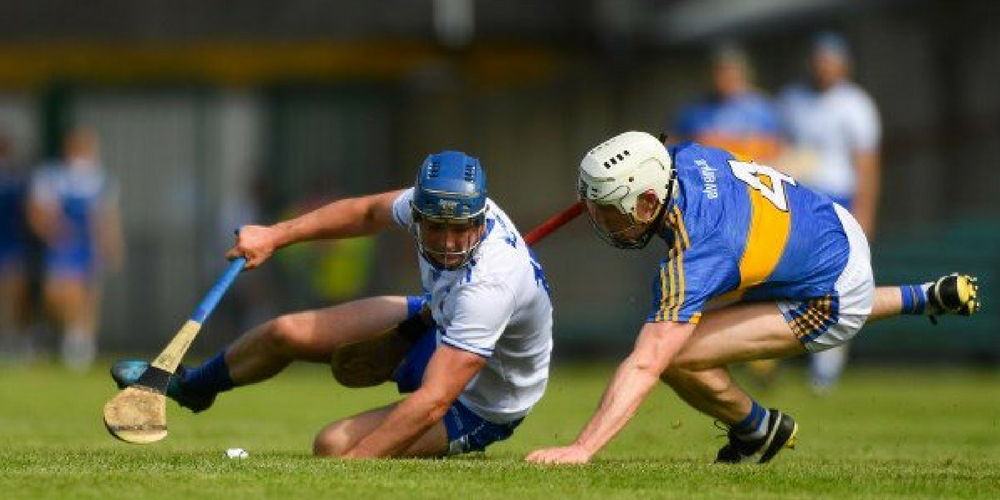A new dawn and challenge for all in Hurling
There is no doubt that the new hurling championship format has produced thrilling encounters and equally enthralling questions and debates. The demands of a consecutive weekly series of match play has also produced an intensity and a demand on players and support staff not experienced in this sport code before.

Waterford’s Michael Walsh tackles Padraic Maher during the Division One semi-final against Tipperary, April 19th. Photo credit: SkySports
While other team sports regularly complete such week on week match play, these teams are generally semi-professional and by and large fully professional in set up.
However, hurling players and team staff are now experiencing far greater demands both on and off the field as they prepare physically, psychologically, technically, tactically, environmentally and all while completing exams, studying, working or merely trying to restore, replenish, rehab, analyse, assess, review and then prepare for the next one. While the science and practice of performance at this level of sport has indeed been well described and planned this is now a new and unique challenge for the intercounty hurler and support staff. Taking advantage of what we know already in performance science is critical if the team and staff are well prepared. Here we take at look at workload monitoring and recovery strategy for better performance.
Professional support essential
If players and staff are seeking to be at their best from week to week then there is no avoiding that they have to become professional in approach. This means applying the key performance principle and practice of Monitoring. Monitoring means recording and tracking all physical work, physical and psycho-emotional recovery and all performance related metrics that have been shown to be important in an athlete’s better performance and ultimately welfare. Decisions are then made which can be individualised to each player and staff member so as to ensure that they are following what is the best programme and approach for the individual. Devices and systems should by now be well in place in all teams at inter-county level to ensure that such monitoring is part and parcel of the life of the player. One such monitoring device that all teams are now wearing is the GPS device. It’s also great to see that an Irish company statsports based in Newry Co Down (www.statsports.com) is at the forefront of this sport performance monitoring technology.

Sean O’Connor, co-founder of STATSports, fits a GPS Viper pod to a player. Photo credit: Independent
If you look closely at the upper back of the player you will see the small bump in the jersey where the player wears the GPS device (between the shoulder blades). This device records distance, speed, acceleration, deceleration and variations of these metrics over 5, 10 and 15 minutes of play throughout the game. Players workload can be monitored throughout all training and practice sessions and the metrics recorded are then used to ensure that a player does not overdo training and practice in between weekly matchplay. While these systems have been used in other sports for well over a decade, thankfully GAA teams are now embracing such technologies which will only support better decision making for the player and team as they meet the challenges of the modern game and championship format.
Recovery is crucial
Another crucial aspect to monitor for both player and team support staff alike is recovery. Here sleep is king. Indeed we have spoken about this in previous blogs and stated that sleep is the most effective and valuable recovery method but unfortunately least monitored and managed. Evidence shows that when sleep is not optimal then a greater incidence of injuries will occur. Indeed that’s not the only negative effect for the team. Physical fitness and psychological fitness recovery will be reduced and will be slower when sleep is not optimised. The new format requires teams and support staff to ensure that they have a recovery sleep monitoring system in place if they are to meet the intense demands of this most exciting and challenging championship format.
Monitoring workload and sleep are just 2 of several metrics that need to be completed every day for players and staff if they are to meet the challenges of the new format. Note that we have not only emphasised the need for monitoring player performance and recovery but we have stressed the need to ensure that staff are also part of this performance monitoring process. Their decision making is also affected by their lifestyle and specifically sleep duration and quality.


Leave A Comment